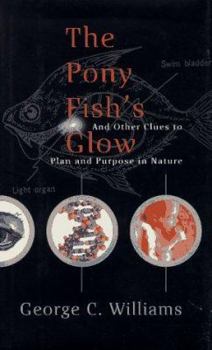The Pony Fish's Glow: And Other Clues to Plan and Purpose in Nature
(Part of the The Science Masters Series Series)
Select Format
Select Condition 
Book Overview
We may regard ourselves as the most advanced species on the planet, but have we really reached our optimum design? Isn't't there always room for improvements? Before you answer, let noted evolutionary... This description may be from another edition of this product.
Format:Hardcover
Language:English
ISBN:046507281X
ISBN13:9780465072811
Release Date:March 1997
Publisher:Basic Books
Length:192 Pages
Weight:0.95 lbs.
Dimensions:0.8" x 6.0" x 9.6"
Customer Reviews
2 ratings
pretty good: read Dawkins and Ridley first though
Published by Thriftbooks.com User , 21 years ago
I read this book because Richard Dawkins called it a classic in an endnote. It's not bad, and if you enjoy reading about biology you'll certainly enjoy it.But I'd recommend books by Richard Dawkins, especially "River Out of Eden," and Matt Ridley, especially "The Red Queen," and "Genome," ahead of this one. Williams also wrote "Why we Get Sick." Although the writing in "Pony Fish" is better, "Why we Get Sick" has a lot more information for the curious, and you might prefer it if you've read a bit of Dawkins and Ridley already.In this book, Williams basically explains adaptionist storytelling and shows the coherence and power of modern Darwinism. To readers of Dawkins and Ridley, there will be very little new information. But it won't bore you either. He covers material such as the perfections and flaws of bodies, the evolution of sexuality and the human experience of reproduction. Again, Ridley and Dawkins cover all this in more depth, and they are more readable authors.The highlight of the book is the last chapter, "Philosophical Implications." It's fairly understated; but it's interesting to see a great scientist take a stab at the religious and philosophical significance of his science. If there's a reason to read the book, it's just because George Williams wrote it, and you probably don't have the privilege of sitting down with him for coffee and picking his brain. This is what he'd tell you if he had the chance, and it's an opportunity to listen.
Essential ideas.
Published by Thriftbooks.com User , 22 years ago
Besides his excellent explanations of 'past evolutions' and the 'evolution at work', the author discusses some essential religious, moral and scientific items.With bees and ants as examples, Prof. Williams explains clearly that the Darwinist evolution is about genes, not about living beings. He also discusses the advantage of sex and aging for a successful gene reproduction.Other important remarks are, firstly, the fact that the brain erupted only to propel genetic success, not to investigate philosophical or other problems. Secondly, there is a probable discrepancy between adaptations dated from the Stone Age and our actual living conditions, which could be at the origin of actual defects (e. g. myopia) or inadaptations.But the more important items lay on a different level.On the religious front, Prof. Williams attacks righteously the God-is-good gospel. Living beings on earth have only one purpose: the success of their own genes. This brings us to a second very important point: natural selection, albeit stupid, is a story of 'unending arms races, slaughter and sufferings'. It is a law of nature and its immorality has to be accepted and, at least, to be thought about.On the scientific front, the author castigates what he calls domain (field) confusion: the mingling of physics, morality, mind and data processing. A frequent example is the mixing of the biological (the working of the brain) and the data processing fields.But more important is the mix up of religion and biology. Prof. Williams declares courageously that it is biologically speaking untenable to declare that a human being exists from the moment of conception. Only a full-term baby is that.This book attacks essential everyday problems and is a must read.






